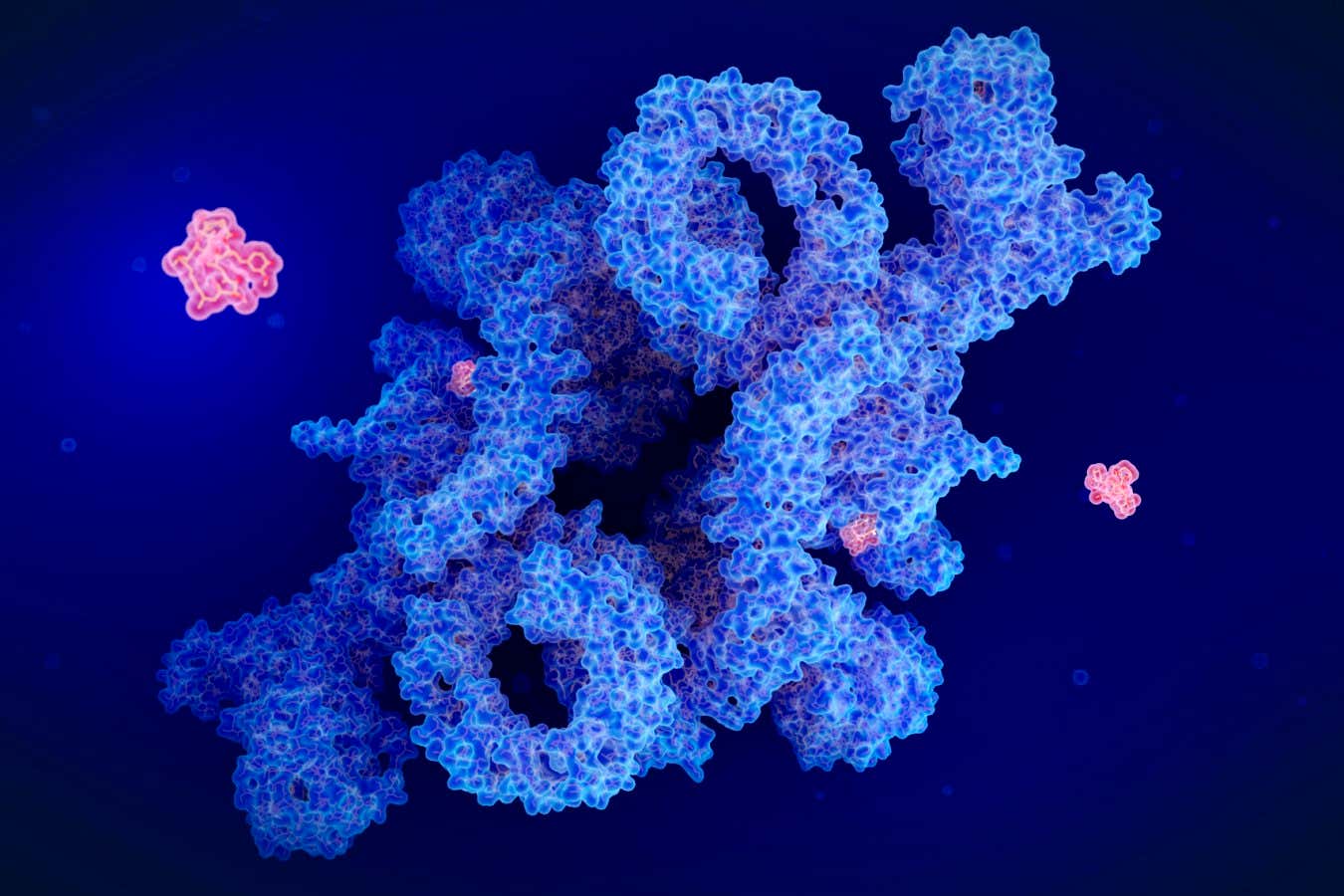Restricting calories has been linked to living longer in many studies, and now it seems that the drug rapamycin has nearly the same effect, at least in animals
An illustration of the drug rapamycin (red) inhibiting the protein complex mTORC1, which has various effects on cellular functionSCIENCE PHOTO LIBRARY/Getty Images
An illustration of the drug rapamycin (red) inhibiting the protein complex mTORC1, which has various effects on cellular function
SCIENCE PHOTO LIBRARY/Getty Images
The drugrapamycinseems to have more or less the same life-extending effect as restricting calories, according to the largest study yet of longevity in different vertebrate species.
Scientists are investigating whether interventions like dietary tweaks and exercise could help us live longer while reducing thehealthimpacts of ageing. Restricting calorie intake while ensuring essential nutrient needs are met, for example,has been shown to extend the lifespan of non-human animalsby as much as 40 per cent.
Read moreThe shocking discovery that our gut microbiome drives ageing
The shocking discovery that our gut microbiome drives ageing
“Anyone in the field who’s paying attention, I think we all have known for a long time that caloric restriction usually works – and by works, I mean increases lifespan,” saysMatt Kaeberleinat the University of Washington in Seattle, who wasn’t involved in the latest research.
Another approach garnering interest is potential anti-ageing drugs, such as rapamycin, which was originally developed as an immunosuppressant. A combination of rapamycin and the cancer drug trametinibwas shown earlier this year to increase lifespan in miceby 30 per cent.
Now,Zahida Sultanovaat the University of East Anglia, UK, and her colleagues have looked at data from 167 studies of lifespan interventions across eight vertebrate species, including fish, mice, rats and rhesus monkeys, but not humans.
Get the most essential health and fitness news in your inbox every Saturday.
The researchers found that dietary restriction, whether via intermittent fasting or just generally cutting calories, extended the lifespan of all eight species, for both males and females – and rapamycin seems to have roughly the same effect. They also looked into the potential of the type 2 diabetes drug metformin, which has similarly been touted as a potential life-extender, but found no longevity benefit.
People shouldn’t start taking rapamycin off the back of these results, though, says Sultanova. “Rapamycin, especially high doses, has side effects because it is supposed to suppress your immune system,” she says, adding thatstudies in mice show it can disturb reproduction. Yet preliminary data from one trial recently indicatedthat low doses of rapamycin are relatively safe in healthy older adults.
The radical new theory that wrinkles actually cause ageingForget vanity, there is a much better reason to care about your laughter lines – wrinkles may be driving ageing in your body and brain via zombie-like senescent cells
The radical new theory that wrinkles actually cause ageing
Forget vanity, there is a much better reason to care about your laughter lines – wrinkles may be driving ageing in your body and brain via zombie-like senescent cells
Kaeberlein also says that people shouldn’t take any medication or restrict their calorie intake in an attempt to stave offageing, with the latterbeing linked to physical weakness and mental health issues. “I think we need to know more about the risk-reward ratio in humans before we can make those sorts of determinations,” he says. “I believe rapamycin will have benefits for some people and we’re learning more and more about who those people are likely to be.”
Otherdrugsthat work similarly to rapamycin, known as rapalogs, could hold more promise if they can extend lifespan with even fewer side effects, says Sultanova.
Kaeberlein says the results fit the patterns he has seen in the literature, but adds that “you always have to be careful when you’re looking across different species because the magnitude of effects that we see in shorter-lived organisms are usually larger than the magnitude we see in longer-lived organisms”.
Journal reference:Aging CellDOI: 10.1111/acel.70131
Aging CellDOI: 10.1111/acel.70131
Receive a weekly dose of discovery in your inbox!
We'll also keep you up to date withNew Scientistevents and special offers.
